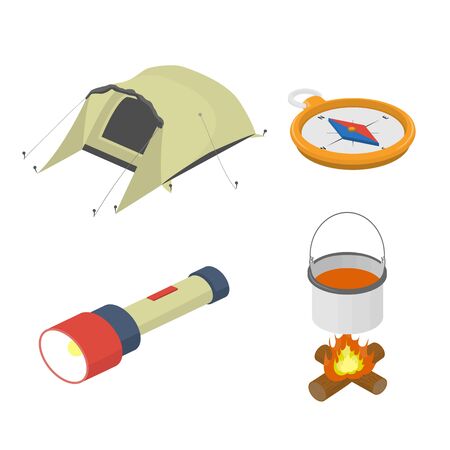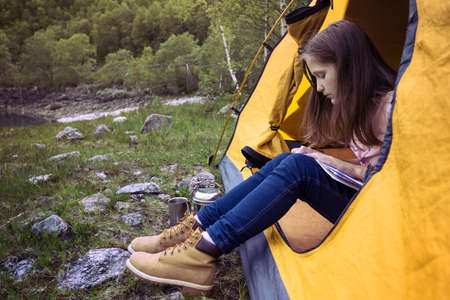Understanding Wild Camping in the UK Context
Wild camping, at its core, is the act of setting up camp away from designated campsites or caravan parks—often in remote, scenic landscapes where nature feels unfiltered and untouched. In the UK, this practice has seen a marked rise in popularity, particularly as people seek to escape crowded tourist hotspots and reconnect with the great outdoors. Unlike traditional campsite camping, which typically offers amenities such as toilets, showers, and sometimes even shops or electricity, wild camping requires a much more self-reliant approach. Campers must carry all essentials, leave no trace behind, and rely on their own resourcefulness for shelter, food, and safety. This growing interest is partly driven by a desire for solitude and adventure, but also by increased awareness of mental health benefits tied to spending time in nature. However, it is crucial to understand that wild camping in the UK operates within a unique legal and cultural framework; unlike some European countries where ‘right to roam’ laws are broad, most land in England and Wales is privately owned and subject to strict access rights. Scotland stands out as an exception with more permissive legislation under the Land Reform (Scotland) Act 2003. Knowing these distinctions is essential for anyone hoping to explore wild camping responsibly across the UK.
2. UK Laws and Regulations on Wild Camping
Understanding the legal landscape of wild camping in the UK is crucial before pitching your tent. The regulations vary significantly across England, Scotland, Wales, and Northern Ireland, with each region enforcing its own rules, rights, and restrictions. Below, we break down the essentials for each country to help you camp responsibly and legally.
England
Wild camping in England is generally prohibited without explicit landowner permission. Most land is privately owned, including national parks such as the Lake District and Peak District. While some areas tolerate discreet overnight stays, especially on high moorland or remote locations, it remains a civil offence to camp without consent.
Key Points for England:
- Landowner permission is required by law.
- No general right to roam with tents; even in National Parks.
- Dartmoor National Park previously allowed wild camping but recent legal challenges have restricted this right.
Scotland
Scotland stands out due to the Land Reform (Scotland) Act 2003, which grants a statutory right of access to most land and inland water for recreational purposes, including wild camping. However, this right comes with responsibilities outlined in the Scottish Outdoor Access Code.
Key Points for Scotland:
- Wild camping is generally permitted on unenclosed land.
- Certain areas may have seasonal byelaws (e.g., Loch Lomond & The Trossachs National Park) restricting camping during peak times.
- Campsites must be small-scale, lightweight, and leave no trace.
Wales
As in England, wild camping in Wales is not generally permitted without the landowner’s consent. While there are beautiful remote spaces like Snowdonia and the Brecon Beacons, official permission should always be sought unless you are staying at a designated site.
Key Points for Wales:
- No automatic right to wild camp.
- National Parks may allow wild camping with specific agreements or permissions.
Northern Ireland
Northern Ireland has some of the strictest restrictions regarding wild camping in the UK. All land is considered private property unless explicitly stated otherwise. There are very few places where wild camping is tolerated without direct permission from the landowner.
Key Points for Northern Ireland:
- Permission from landowners is almost always required.
- Some forests and coastal areas managed by public bodies may offer limited ‘wild’ style camping spots with prior arrangement.
Summary Table: Wild Camping Legalities Across the UK
| Region | Legal Status | Main Restrictions/Notes |
|---|---|---|
| England | Not permitted without permission | Dartmoor exception recently limited; permission usually required everywhere |
| Scotland | Permitted under Access Code | Avoid enclosed/farmed land; follow local byelaws; Leave No Trace essential |
| Wales | Not permitted without permission | Largely same as England; some leniency in remote areas with discretion and respect |
| Northern Ireland | Not permitted without permission | Very limited opportunities; seek explicit consent |
If you plan to wild camp anywhere in the UK, always check local authority websites for updates and adhere strictly to any posted signage or seasonal restrictions. Responsible behaviour ensures that these treasured landscapes remain accessible for future generations.

3. Ethical Wild Camping: The Principles of Leave No Trace
Wild camping in the UK is a privilege, not a right, and with it comes the responsibility to protect the landscapes we cherish. At the heart of responsible wild camping are the principles of Leave No Trace—a set of guidelines designed to minimise our impact on nature and ensure that these beautiful places remain unspoilt for future generations. Below, we discuss essential best practices every wild camper should follow to camp ethically and respectfully.
Minimise Your Environmental Impact
Always choose your campsite carefully. Opt for durable ground away from delicate vegetation, water sources, and established footpaths. Avoid disturbing wildlife by keeping a respectful distance from nesting areas or animal habitats. Never cut live wood or damage trees for firewood—bring a portable stove instead.
Pack In, Pack Out
Everything you bring in must go out with you, including all rubbish, leftover food, and even biodegradable waste. Littering is not just unsightly; it can harm wildlife and pollute watercourses. Always carry bin bags and make sure your site is cleaner than when you arrived.
Respect Local Communities
The countryside is not just a playground—it’s home to people who live and work there. Keep noise to an absolute minimum, especially at night, and avoid camping near homes or farmland without explicit permission. If you encounter landowners or locals, be polite and open about your intentions; a friendly attitude goes a long way.
Sanitation and Human Waste
Properly managing human waste is critical. Use established toilets where available; if not, bury waste at least 15cm deep and 50 metres away from water sources or paths. Toilet paper should be packed out or burned safely—never left behind.
Fires and Cooking
Open fires are discouraged in most wild camping locations due to the risk of wildfires and lasting scarring on the land. Instead, use portable camping stoves for cooking. If fires are permitted, keep them small, controlled, and leave no trace by removing all evidence before you depart.
Leave What You Find
Avoid picking plants, moving stones, or altering the environment in any way. Take only photographs and memories—leave everything else untouched so others can enjoy the same sense of discovery.
A Culture of Respect
At its core, ethical wild camping is about respect—for nature, for wildlife, for local communities, and for other visitors who follow in your footsteps. By following these principles diligently, you help preserve access for everyone and contribute positively to the reputation of wild campers throughout the UK.
4. Choosing Suitable Wild Camping Locations
Wild camping in the UK offers a unique opportunity to experience the countryside, but picking the right location is crucial for both safety and legality. Understanding where you are allowed to pitch your tent will help avoid unnecessary conflicts and ensure you have a positive experience. Below, we break down the essentials for choosing your wild camping spot responsibly.
Understanding Access Rights in the UK
The rules around wild camping differ across England, Wales, Scotland, and Northern Ireland. While Scotland’s Land Reform Act 2003 allows wild camping on most unenclosed land, England and Wales operate under stricter access laws, usually requiring landowner permission unless you’re on Dartmoor or other specifically designated areas. Northern Ireland is mostly private land, so permission is almost always necessary.
| Region | General Access Rights | Popular Wild Camping Areas |
|---|---|---|
| Scotland | Permitted on most unenclosed land (with respect) | Cairngorms National Park, Loch Lomond & The Trossachs* |
| England | Permission needed except some parts of Dartmoor | Dartmoor National Park*, Lake District (with discretion), Yorkshire Dales |
| Wales | Permission required from landowners | Snowdonia (seek consent), Brecon Beacons (remote areas with discretion) |
| Northern Ireland | Almost all land is private; permission required | Mourne Mountains (designated sites only) |
*Special bylaws or restrictions may apply; check local regulations before setting out.
Tips for Selecting Your Wild Camping Spot
- Aim for remote locations away from roads, buildings, and popular footpaths to maintain privacy and minimise disturbance.
- Avoid farmland during lambing or calving seasons and never camp on cultivated fields or near livestock.
- Select flat, well-drained ground ideally with some natural shelter from wind.
- Stay at least 100 metres from water sources to prevent pollution but close enough for convenience—always use Leave No Trace principles.
Safety Considerations When Wild Camping
- Check the weather forecast and be prepared for rapid changes, especially in upland or coastal areas.
- Inform someone of your intended route and estimated return time.
- Avoid pitching too close to cliffs, rivers prone to flooding, or lone trees that might attract lightning.
Summary Table: Key Factors for Spot Selection
| Factor | Why It Matters |
|---|---|
| Remoteness | Reduces disturbance and increases privacy |
| Shelter | Protection from wind/rain ensures comfort and safety |
| Land Ownership | Avoids legal issues; always seek permission if unsure |
Selecting a suitable wild camping location in the UK means balancing adventure with responsibility. By understanding regional laws, respecting access rights, and prioritising safety, you can make the most of your outdoor experience while preserving these spaces for others.
5. Essential Gear and Packing for Responsible Wild Camping
Wild camping in the UK requires careful selection of gear to ensure comfort, safety, and minimal environmental impact. Below is a guide to the key items you should pack, with a focus on practicality, lightweight solutions, and eco-friendly choices.
Lightweight Shelter Options
- Bivi bags or small tents: Opt for low-profile, single or double-skin tents or bivi bags that blend into the landscape. They are easy to pitch and pack away swiftly.
- Tarp shelters: Versatile and extremely light, tarps can be set up in multiple configurations, making them ideal for various weather conditions across the UK.
Sleeping System
- Down or synthetic sleeping bag: Choose a sleeping bag suited to British temperatures; down offers excellent warmth-to-weight ratio but ensure it is responsibly sourced.
- Sleeping mat: An insulated roll mat or inflatable pad provides comfort and insulation from damp ground—crucial for British moorland or woodland camping.
Cooking Equipment
- Compact stove: A lightweight, gas or alcohol stove reduces fire risk and helps follow Leave No Trace principles. Open fires are discouraged in most wild areas.
- Reusable cookware: Invest in durable pots, cutlery, and mugs—preferably titanium or stainless steel—for longevity and minimal waste.
Sustainable Water Solutions
- Water filter or purification tablets: Access to clean water can be unpredictable. Carrying a portable filter or tablets means you can safely use natural sources without plastic waste.
Packing Essentials
- Rucksack (40-60L): Lightweight but robust enough to carry all your essentials comfortably over rough terrain.
- Packing cubes or dry bags: Keep gear organised and protected from the infamous British rain.
Clothing Layers
- Base layer: Moisture-wicking materials like merino wool keep you dry.
- Insulating layer: Fleece or lightweight down jacket for warmth in variable British weather.
- Waterproof outer shell: Breathable jackets and trousers are essential due to frequent rainfall across the UK.
Litter and Waste Management
- Pocket-sized rubbish bags: Always pack out what you bring in—including food scraps and biodegradable waste.
Other Responsible Camping Tools
- Head torch with red light mode: Minimises disturbance to wildlife at night.
- Pocket map/compass or GPS device: Essential for navigation as many wild sites lack clear signage or mobile signal.
Selecting the right kit not only ensures a safe and enjoyable experience but also reflects a genuine respect for the UK’s wild landscapes. Prioritise multi-use, repairable items and avoid single-use plastics wherever possible. Being properly equipped is key to treading lightly and leaving no trace during your wild camping adventure.
6. Wild Camping Etiquette: Engaging with Locals and Fellow Campers
Respect and consideration form the bedrock of responsible wild camping in the UK. When venturing into rural or natural areas, it is crucial to remember that you are a guest—not only on the land but within local communities. Practising good etiquette ensures a positive experience for everyone and helps maintain access for future wild campers.
The Importance of Courtesy
Always greet landowners, farmers, and locals with politeness if you encounter them. A friendly “hello” or a brief chat can go a long way in building goodwill. Should you need to ask permission to camp or cross private land, do so respectfully and be prepared to explain your intentions clearly. If refused, accept their decision without argument and move on—never camp where you have been asked not to.
Communication with Fellow Campers
While wild camping often means solitude, you may occasionally meet other campers. Respect personal space and keep noise levels low, particularly at night. Share knowledge about the area if asked, but avoid intruding unless invited. Remember, everyone seeks their own connection with nature; preserving tranquillity is key.
Adhering to Local Customs
Different regions in the UK may have unique traditions or unwritten rules regarding land use and behaviour. Take time to research local customs before arriving—whether it’s livestock gates that must be closed behind you or specific restrictions during lambing season. Observing these nuances demonstrates respect and prevents misunderstandings.
Maintaining Good Relations: Recommendations
- Leave no trace: Clear all litter and evidence of your stay.
- Avoid lighting fires unless explicitly permitted; use a camping stove instead.
- Camp discreetly, away from homes, paths, and popular viewpoints.
- Keep groups small—large gatherings are more likely to attract negative attention.
- If approached by locals or rangers, engage openly and respond honestly.
Cultivating respectful relationships with both residents and fellow outdoor enthusiasts not only enhances your own wild camping adventure but also protects this cherished freedom for others across the UK.
7. Emergency Preparedness and Safety Tips
Wild camping in the UK offers adventure, solitude, and a close connection to nature—but it also demands thoughtful preparation for emergencies and personal safety. The British countryside is renowned for its rapidly changing weather, remote locations, and unique hazards. Whether you’re pitching your tent on Dartmoor or exploring the Scottish Highlands, being ready for the unexpected is essential.
Know Before You Go: Planning for Emergencies
Before setting out, always leave your trip details with someone you trust. Include your planned route, expected return time, and any backup plans. Invest in a reliable map (such as an Ordnance Survey) and compass—and ensure you know how to use them; phone signals can be patchy or non-existent in rural areas. Download offline maps and emergency contact apps if possible. In Scotland and other remote regions, consider carrying a personal locator beacon (PLB) for added reassurance.
Weather Awareness: Expect the Unexpected
The UK’s weather is famously unpredictable. Check local forecasts from trusted sources like the Met Office before departure, but prepare for rapid changes—especially in upland or coastal areas. Pack waterproof clothing, warm layers, and a sturdy shelter even during summer months. Be wary of sudden fog on moorland or mountains, which can disorient even experienced walkers. Always have an emergency food supply and enough water purification tablets or filters.
Personal Safety: Minimise Risk
- First Aid: Carry a well-stocked first aid kit tailored to wilderness use—including blister plasters, tick removers, and antihistamines for stings or bites.
- Fire Safety: Wildfires are a growing concern in dry periods—use stoves rather than open fires, keep flames away from vegetation, and follow local fire bans.
- Wildlife & Livestock: The UK has few dangerous animals, but avoid disturbing livestock or nesting birds. Keep food secured against foxes and rodents.
Hygiene & Water Safety
Practice Leave No Trace principles—bury human waste at least 30 metres from water sources using a trowel, and take all rubbish home with you. Always treat wild water before drinking to avoid waterborne illnesses common in some rural streams.
If Things Go Wrong: What To Do
If you become lost or injured, stay calm and remain where you are if safe to do so. Use your whistle (six blasts per minute is the recognised distress signal) and mobile phone or PLB if available. In life-threatening situations, dial 999 or 112 and ask for Mountain Rescue or the Coastguard as appropriate—be prepared to give grid references from your map.
With thorough preparation and respect for local conditions, wild camping in the UK can be both rewarding and safe—allowing you to enjoy Britain’s wild places responsibly while staying secure whatever nature throws your way.


